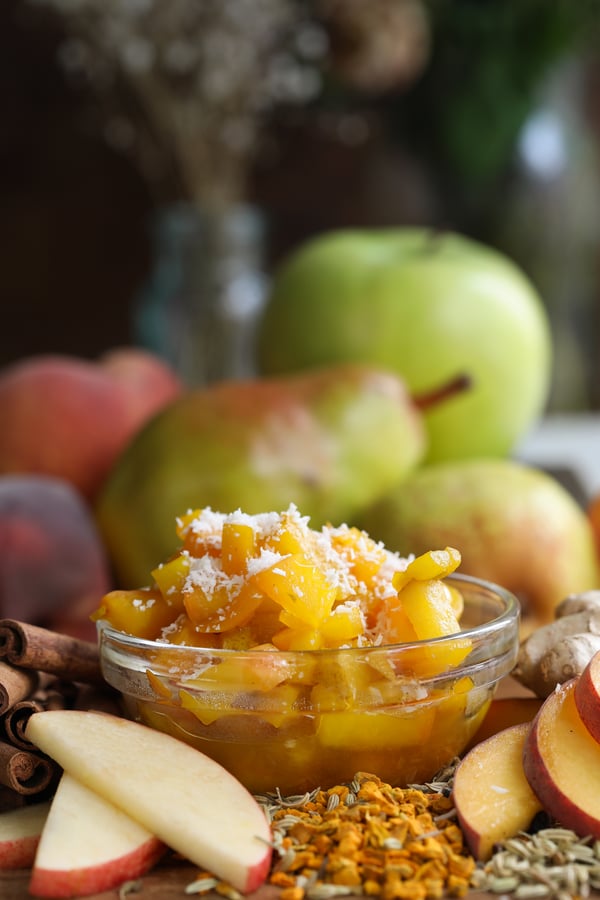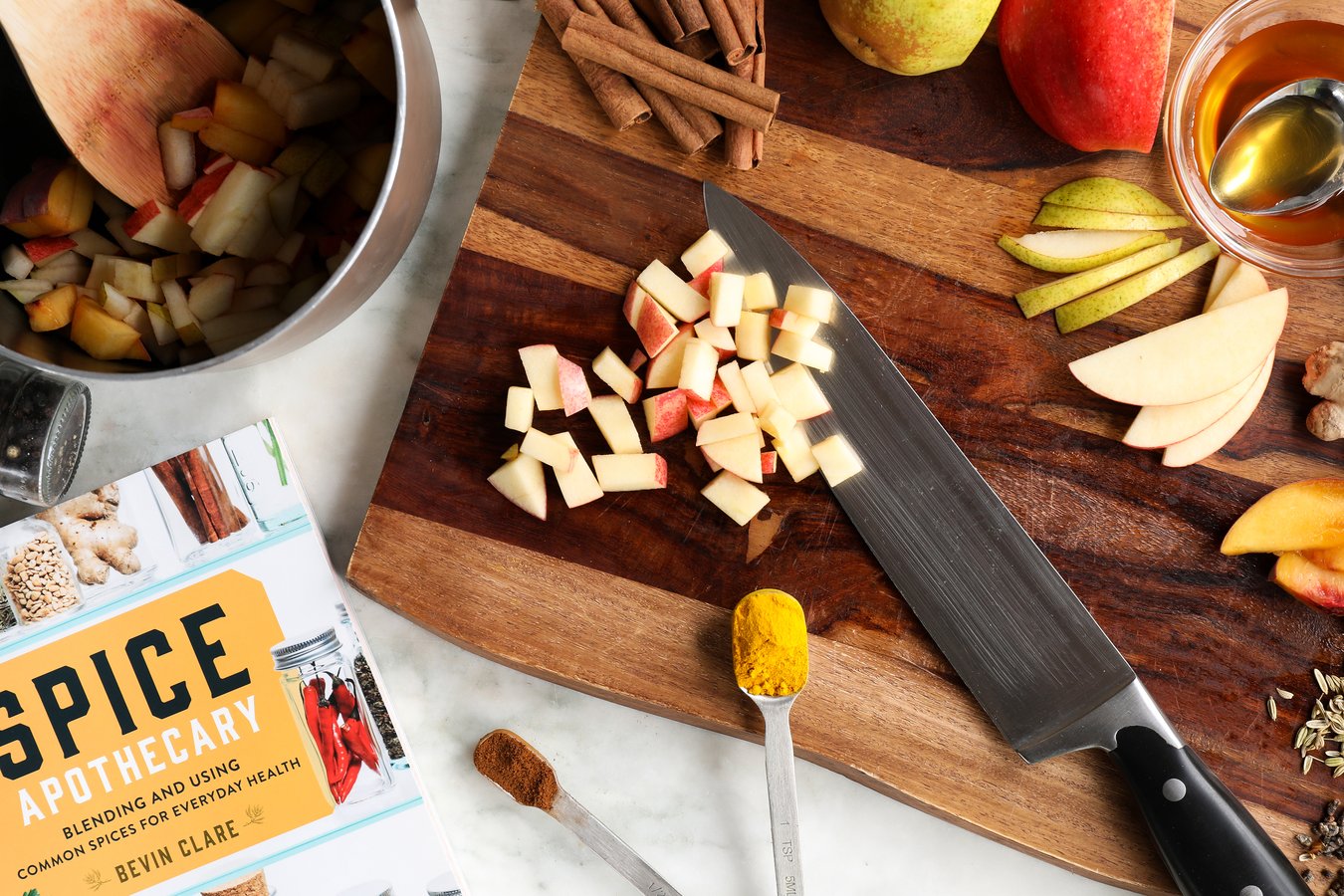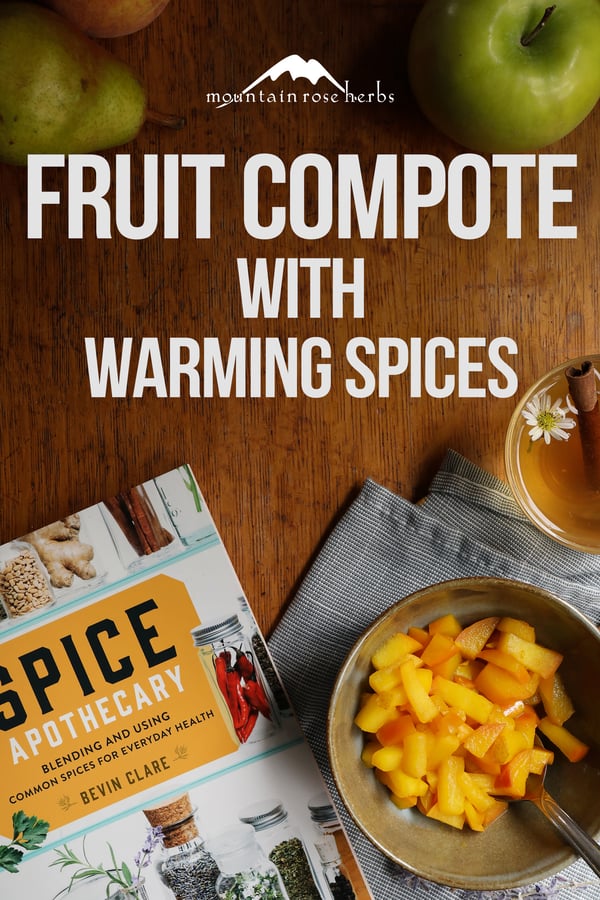
Fruit compote might be the most flexible and versatile digestive support you’ll make this fall. It’s a mishmash of all sorts of delicious things and there aren’t many rules—all you need is some fruit you can cook and make squishy--and it’s the perfect vehicle for all sorts of herbs and spices.
I’m going to admit, my first experience with the venerable fruit compote was pretty funny. As a kiddo raised on whole foods and eating out of the garden, one of the most exciting treats we were allowed was a Friday evening TV dinner in those little paper trays that my parents, exhausted from a long work-week, would stick in the microwave and be done with it. I’m not sure what was in those TV dinners, but I clearly remember saving the tiny square of “fruit compote” for the very end as my dessert. It was warm, fruity, sweet, tangy, and delicious. I have no doubt that we can all outshine that microwaved little compartment by making our own.
A fruit compote is basically a chunky fruit sauce, similar to applesauce, but not pureed (or only partially pureed). It often has the addition of syrup, honey or sugar, but all of that is optional. There aren’t a lot of rules here: you can use fresh or dried fruits, a single fruit or a combination, any sweetener you want (or none) and whatever herbs and spices you think would make it delicious. Using a base of apple, peach, pear, plum, or prune will give it a base which has an ideal consistency.
This compote is a balm for an irritated or unbalanced digestive system. The carminative herbs and spices can help ease discomfort from gas, and the cooked fruits in the compote offer pectin and other helpful food for your gut bacteria. It’s a great breakfast (or even a dessert!) and is good warm or cold, alone or with yogurt, or a smoothie, or on oatmeal, or on whatever you would like! Making a large batch and freezing some in smaller containers can make it an easy grab when you need a little support. For extra digestive support you can sprinkle in the contents of a probiotic capsule before eating.
Some options include (but are by no means limited to!):
|
Fruits (fresh or dried) |
Herbs and spices |
Other |
|
Apples |
Honey |
|
|
Peaches |
Sugar |
|
|
Pears |
Maple syrup |
|
|
Plums / prunes |
Vanilla extract |
|
|
Berries |
Almond extract |
|
|
Mango |
Citrus peel / zest |
|
|
Banana |
||
|
Cherries |
Molasses |
|
|
Grapes |
||
|
Pomegranate |
||
|
Papaya |
||
|
Figs |
Directions to Make Compote
- Place the chopped fruits in a small saucepan.
- Add a few tablespoons of water and any sweetener you desire, just enough to barely cover the bottom of the pan. If you are using only or mostly dried fruits, you will need to add a little more water or tea to moisten.
- Sprinkle in your preferred spices and stir well.
- Cook, covered, over medium-high heat until the fruit is softened but not completely mushy, stirring occasionally.
- Remove from heat and cool.
- The compote will keep in the refrigerator for a week or two and can also be frozen.
In my book Spice Apothecary (Storey Publishing, 2020), I share recipes for tasty herb- and spice-rich kitchen concoctions, such as the “warming digestive blend” below, which you can add to your compote.
Warming Spice Blend for Digestion
Ingredients
- 4 tsp. organic cinnamon powder
- 1 tsp. organic turmeric root powder
- ½ tsp. organic ginger root powder
- ½ tsp. organic fennel seed powder
- ½ tsp. organic cardamom powder
- ¼ tsp. organic ground black pepper
Directions
- Mix all ingredients together.
- Use immediately or store in an airtight jar for later use.
Text and recipe excerpted and slightly adapted from Spice Apothecary © by Bevin Clare.
All Rights Reserved.
Want to find more ways to enjoy spices for everyday wellness?
Check Out My New Book Spice Apothecary!
You may also be interested in:
- 3-Seed Herbal Cordial Recipe for Digestion
- Best Herbs for Digestions + 3 Easy Recipes
- DIY Dandelion & Orange Bitters for Digestion












